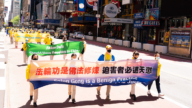【新唐人2014年12月16日訊】今年的12月10號,是聯合國《世界人權宣言》通過66週年,也是《聯合國禁止酷刑公約》通過30週年。東南亞國家,尤其是中國大陸、老撾、柬埔寨、朝鮮等國濫用酷刑的問題再次成為國際社會關注話題。
據《德國之聲》報導,日前,國際人權觀察組織大赦國際要求「徹底落實聯合國在30年前就通過的反酷刑公約。」報導指出,全球有很多國家雖然制定了反酷刑法,但實際上仍繼續著非人道的行為。
反酷刑公約,又稱聯合國禁止酷刑公約,自1984年12月10號聯合國大會通過公約草案後,已經有146個締約國簽署了這一條約。儘管公約的第2條明文要求各締約國必須在管轄領土內,防止和避免出現酷刑行為。但人權組織發現,在一些締約國中,酷刑仍然非常普遍的存在著,其中最嚴重的就是中國、朝鮮、老撾、柬埔寨、緬甸等共產極權國家。
對此,美國華府人權律師葉寧也指出,目前,有大量的證據證明,中國大陸是世界上實行酷刑最大規模、記錄最惡劣的國家。
美國華府人權律師葉寧:「特別是在1999年7月鎮壓法輪功以後,酷刑更是達到了登峰造極的地步——酷刑達到如果活摘人體器官的話,那就是最瘋狂、最極端的一種酷刑行為,實際上正在受到自由人類和國際社會的調查和譴責。在這種情況下,中國作為一個普遍實施酷刑的國家,已經成了世界的公認了,無需太多的證明。」
法輪功學員賈亞琿曾在遼寧省馬三家女子勞動教養院被非法關押多年,回想起在獄中受到的酷刑,賈亞琿至今不寒而慄。
法輪功學員賈亞琿:「我經歷的有大掛、電擊、還有一種就是把人吊起來,還有一種倒掛,它把人整個大頭朝下掛著。 還有我看到有的人綁『死人床』,有的用牙籤紮在手指肚,還有老虎凳。還有因為在勞教所嘛,它肯定在衛生各個方面不好,有傳染病啊,很多人身上起疥,就是那種傳染病,他們用那個鐵刷子刷身上⋯⋯」
此外,很多律師以及受過酷刑迫害的當事人還證明,在中國大陸的監獄、勞教所等關押場所裡,女性往往要承受侵犯女性尊嚴的刑罰。
賈亞琿:「就是先把人綁在床上,四肢不能動,身體呈九十度角度狀態,然後他們會用電棍順著腋窩、乳房、腰的後部就是對著腎的位置,他們會不停的電擊那個位置,再往下就是陰部,大腿內側啊,他就找你敏感部位,不停的電。 最嚴重的時候,不讓人穿衣服,你是(法輪功)學員嘛。本來是女子勞教所,但他們說很多男警察在裏面,根本就一點尊嚴都沒有了。」
大陸維權律師唐吉田:「女性有時候,一些當事人陳述,會有性騷擾啊,甚至個別出現性侵。包括有時辦案人員喪失倫理底線,用一些物體對女性隱秘部位進行反覆碰觸,甚至用警棍去擊打啊,有時候是帶電的。」
12月9號,美國參議院情報委員會(Senate Intelligence Committee)發佈了關於中央情報局(CIA)審訊恐怖主義嫌疑人的報告,中共官方媒體對此進行了大肆報導和抨擊。聯合國酷刑問題特別報告員門德斯(Juan Méndez),在接受《德國之聲》採訪時說,他對美國參議院公布酷刑報告表示讚許,同時希望中國、伊朗和俄羅斯等存在嚴重人權問題的國家,也應該公布本國的酷刑報告。
外界普遍認為,一貫在人權問題上進行掩蓋和封鎖的中共當局,不會同意聯合國這一要求。而大陸維權律師唐吉田認為,中共當局即使同意公布酷刑報告,也不會將真實情況曝光。
唐吉田:「我倒不覺得它絕對不公布,有可能它在一定條件下它也會公布,但是這些資料的真實性、完整性、可核查性可能很難保證。另外,可能國際上一些人權工作者、人權機構想在中國大陸獲取第一手資料、真實的信息恐怕是非常困難的。」
葉寧指出,中共當局簽署反酷刑公約的目的,並不是為了履行義務,而是一種作秀和在國際公共關係中的一種姿態。國際社會和人權組織對中共的任何呼籲和規勸都是無用的,因為流氓無產專政是無法離開酷刑而存在的。
採訪/易如 編輯/張天宇
Torture in China Highlighted During the 30th Anniversary
of Adopting UN Convention against Torture.
Dec.10 marks the 66th anniversary of the adoption
of United Nations’ Universal Declaration of Human Rights,
celebrates the 30th anniversary
and the 30th anniversary to the adoption of Convention against
Torture and Other Cruel, Inhumane or Degrading Treatment
or Punishment, by the United Nations General Assembly.
Southeast Asian countries, especially the abuse of torture in China,
Laos, Cambodia, North Korea and other countries,
once again became the topic of concern by the
international community.
According to “Deutsche Welle" a few days ago, Amnesty
International, an international organisation
for the human rights watch, requires
“A thorough implementation of the Convention against
Torture adopted by the United Nations 30 years ago."
The report says, although many countries around the world have
developed anti-torture laws, some countries still continue
to commit inhumane acts.
The Convention Against Torture is also known as
the Convention against Torture and Other Cruel,
Inhuman or Degrading Treatment or Punishment.
Since the UN General Assembly adopted the draft
convention on Dec. 10 of 1984,
146 State Parties have signed this convention.
The Article 2 of the Convention expressly requires
all signed state parties shall prevent and avoid acts
of torture within the territorial jurisdiction.
However, human rights groups found that
in some signed states, torture is still very prevalent,
especially in countries such as China, North Korea, Laos,
Cambodia, Myanmar and other communist totalitarian countries.
US human rights lawyer Ye Ning pointed out, at present,
plenty of evidence proves that China is found
to be the biggest violator of torture (in the world).
Ye Ning: “Especially the persecution of Falun Gong
since July 1999, torture in China reached a pinnacle status –
if torture reached in to the realm of human organ harvesting
from living people,
then it is the craziest, most extreme form of torture.
In fact, human freedom and the international community are
investigating and condemning such organ harvesting crimes.
Under such circumstances, China as a nation, with a universal
existence of torture, has become recognised in the world,
without much need for additional proof."
Falun Gong practitioner Jia Yahui had been detained
in Masanjia Women’s Labor Camp of Liaoning Province
for many years.
When Jia Yahui recalls her experiences of being tortured
in prison, she still trembles with fear.
Falun Gong practitioner Jia Yahui: “I experienced torture, such
as long periods of being hung up in various ways, upside
down etc and electric shocks to various parts of my body.
I saw some others tied to the"Dead Bed", toothpicks
were stuck under finger nails, and others subjected to
the “Tiger Bench".
Also, the hygiene in these places in unsavoury at best.
Infectious diseases abound and many people suffered
scabies which is infectious,
and they used the iron-brush to brush the body.
Many people, including lawyers, were subjected to torture,
also the women who had to endure violations
of their dignity.
Jaya Hui: “They tied women to a bed, limbs cannot move
and the body was at a status of right angles.
Then they used electric batons to shock the armpits, breasts,
and particularly the rear waist in the position
of the kidney’s without interruption.
They also shocked the private parts, the inner thighs etc.
They looked for the sensitive parts to shock.
At worst, we were not allowed to wear clothes,
because we are (Falun Gong) practitioners.
Even if that is a women’s labor camp,
there are still lots of male police working there.
So we have so little dignity."
Mainland human rights lawyer Mr Tang Jitian:
“Some women clients said there was sexual harassment,
even sexual assault.
This included some individual investigators sometimes
going below the basic ethical bottom line,
using some objects to repeatedly touch the hidden parts
of the female body, even using electric batons
to shock these parts."
Dec. 9, the US Senate Intelligence Committee released
a report on the Central Intelligence Agency (CIA)
interrogation of terrorism suspects,
and China’s official media gave
an extensive coverage and criticism.
UN Special Rapporteur on Torture Juan Méndez
told the “Deutsche Welle" in an interview, that he praised
the US Senate in publishing these reports of torture,
but also hoped China, Iran, Russia and other countries,
which all have serious human rights problems,
also should publish their reports on torture.
The public widely believes that the Chinese authorities (CCP),
who are well known for concealing human rights issues,
would not agree to this request of the United Nations.
The mainland human rights lawyer Tang Jitian believes
that even if the Chinese authorities agreed to publish
reports of torture, they will not expose
the true torture situation.
Tang Jitian: “I do not think they will not release
the torture situation, and it is possible to publish
under certain conditions.
But the data’s authenticity, integrity and verifiability
may be difficult to guarantee.
In addition, if some international human rights workers
and human rights organisations want to obtain first-hand
information on China,
the real information might be very difficult to obtain."
Ye Ning pointed out that the purpose
of the Chinese authorities signing
the Convention Against Torture,
is a show and a stance in international public relations
rather than for fulfilling their obligations.
It is useless for the international community
and human rights organisations to make any appeals
and exhortations to the CCP,
because rogue proletarian dictatorship is unable to exist
without the tortures for persecuting innocent people.
Interview/YiRu Edit/Zhang Tianyu


























